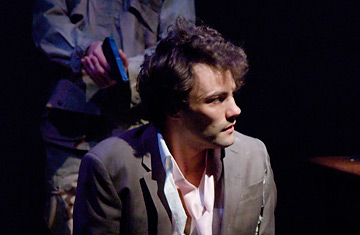
A scene from the play Baghdad wedding.
Injecting politics into popular entertainment is never an easy task. London's West End these days is dominated by splashy musicals like Disney's Lion King and the Abba-inspired Mamma Mia, not challenging dramas by George Bernard Shaw or Arthur Miller. But ever since the invasion of Iraq, the political temperature has been rising on the London stage.
At least a dozen plays about Iraq — and many others more broadly about the Middle East — have been staged in London over the last four years. A few of them, like The Madness of George Dubya and A Weapons Inspector Calls, both cheekily satirizing the Blair-Bush axis, have successfully made the transfer from fringe to West End hits.
Only a few years ago British arts critics were bemoaning the theater's detachment from politics. Where were the plays that dealt with the big issues? Iraq changed that. "I think it has revived the fortunes of political theater," says Benedict Nightingale, theater critic for the Times of London. "Here's something people felt strongly about and playwrights are there to respond to that worry."
Since 2003 London has played host to such political dramas as David Hare's Stuff Happens and Richard Norton Taylor's Called to Account, in which Tony Blair is put on trial for "aggression against Iraq." But the latest offering, Baghdad Wedding, written by Iraq expatriate Hassan Abdulrazzak, doesn't focus on political impact of the war. It looks at what has happened to Iraq's middle classes, in particular those who have fled to the safety of western cities like London, Paris and New York.
"What I wanted to do was flag what I know about Iraq," Abdulrazzak told TIME. "[It's] now being seen as a religiously crazed country...I wanted to show the middle-class segment that people could relate to."
The play tells the story of three friends who left Iraq for London during Saddam Hussein's rule. All are Westernized, middle-class professionals, with a penchant for whisky and a preference for quoting Martin Amis over the Koran. Oscillating between Baghdad and London in the years 1998 and 2005, the play skillfully dramatizes the tug between two locations and two states of mind in the central character of Salim, a bisexual doctor who has just penned a controversial novel entitled Masturbating Angels, partially in rebellion against his Iraqi heritage. Though initially in favor of the invasion, Salim returns to Iraq with his friends for a wedding to find the country slowly descending into chaos, virtually unrecognizable from the childhood memories of peaceful neighborhoods and starry night skies he rhapsodized about in London.
The theme of exile mirrors the author's own life. Abdulrazzak left Iraq when he was eight years old. His father, an academic and a non-Baath party member, was persecuted by the regime and fled to Egypt and Algeria before finally arriving in London. A molecular scientist at London's prestigious Imperial University, Abdulrazzak was inspired to write about his home country after voting in absentia during Iraq's 2005 elections. The expatriates were "all invested" in the election, says Abdulrazzak. "That was the last moment of hope and I try to capture that tension of feeling."
Abdulrazzak's experience of loss and return is shared by other prominent Iraqi artists abroad. "You're an exile when forced by the government to be ousted from your country," said Abdul Karim Kasid, a prominent Iraqi poet and dramatist also based in London. "Now we're not forced out by the government but by the situation."
Earlier this year Kasid returned to his hometown of Basra by invitation of the Ministry of Culture after he translated the C.R. Ramuz-Igor Stravinsky opera The Soldier's Tale into Arabic. He has no plans to return permanently, however, and sees the diaspora as being potentially fruitful for artistic expression. "There's a new [Iraqi] generation involved in [British] culture but related to ours — so this relationship can create something new for the future."
Still, the plays by these Iraqi exiles have a fatalism that reflects the daily reality of life back on the streets of Baghdad and Basra. Toward the end of Baghdad Wedding, Marwan, the play's narrator, leaves Baghdad for London, declaring, "This country is finished." Is that how the exiled Abdulrazzak and his fellow artists feel?
"If a secular voice returns to the country there could be hope," he says. "But right now it's very bleak. The country is obviously in danger, but I believe Iraq could recover."
